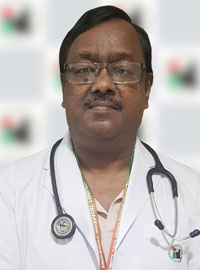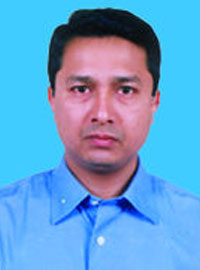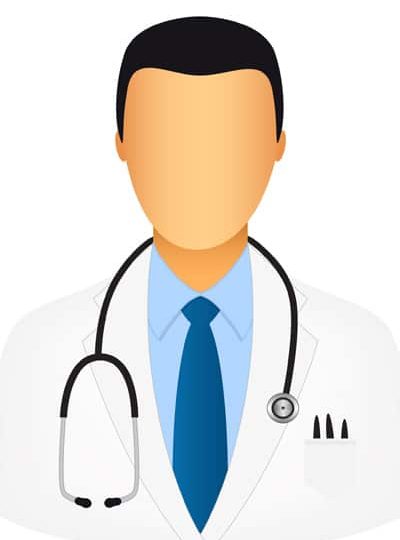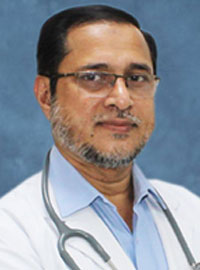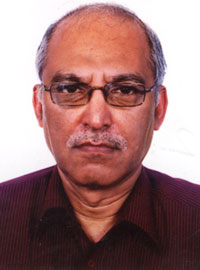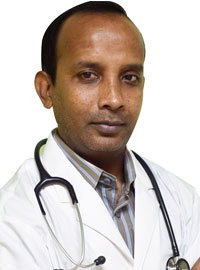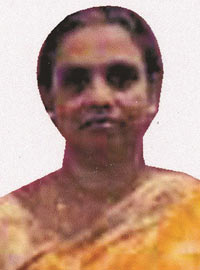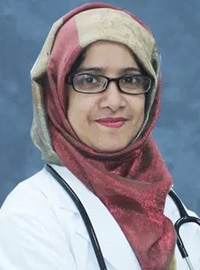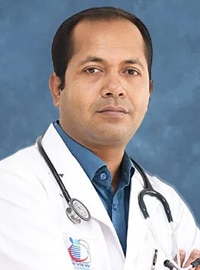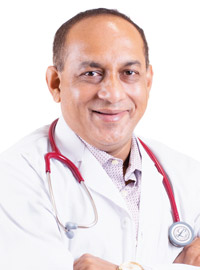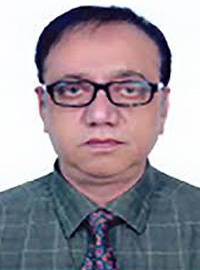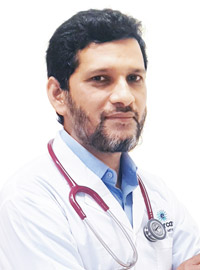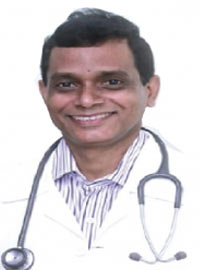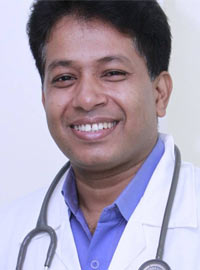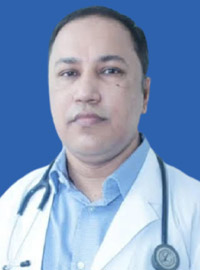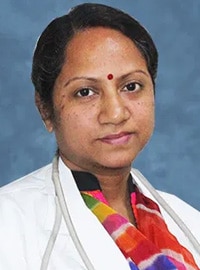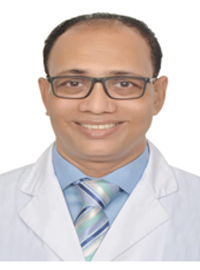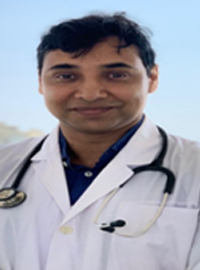Dr. Kazi Mohibur Rahman MBBS, MD (Neurology) Fellow - Interventional Neurology & Stroke Therapy, SGRH (N.Delhi) Clinical & Interventional Neurologists Assistant Professor, Dept. of Neurology Dhaka Medical College Hospital Chamber : LABAID Limited (Annex) House No. 1, Road No. 4, Dhanmondi Dhaka-1205, Bangladesh. Phone : 8610793-8, 9670210-3, 8631177 (chamber) Mobile : - Visiting Hours : 5:00 PM - 9:00 PM [ Thus & Fri Closed ] | Dr. A.T.M. Mosharef Hossain MBBS, FCPS, FICS Neurology Specialists / Neurologists Associate Professor, Department of Neurosurgery Bangabandhu Sheikh Mujib Medical University Shahbagh, Dhaka, Bangladesh Chamber : DHANMONDI CLINIC (PVT.) LTD. 61, Multiplan, Green Road Dhaka-1205, Bangladesh. Phone : 01190-476626, 9675511 (chamber) Mobile : 01919-843433 Visiting Hours : 6:00 PM - 8:00 PM | Dr. Mohammad Hossain MBBS, MS (Neurosurgery) Trained, Spine Surgery, USA Endoscopic Spine Surgery, Switzerland Visiting Neurosurgeon, USA. Neurosurgeon & Spinal Surgeon Assistant Professor Neurosurgery Department Bangabandhu Sheikh Mujib Medical University (BSMMU) Chamber : TRAUMA CENTER 22/8/A, Shyamoli, Mirpur Road Dhaka, Bangladesh. Phone : +88-02-8116969, 8130508 (chamber) Mobile : 01814-971043 Visiting Hours : 7:00 PM - 9:00 PM [Friday Closed] |
Saturday, March 23, 2013
Neurology Doctor in Bangladesh
Tuesday, October 23, 2012
Diabetes
What Is Diabetes? What Causes Diabetes?
Diabetes, often referred to by doctors as diabetes mellitus, describes a group of metabolic diseases in which the person has high blood glucose (blood sugar), either because insulin production is inadequate, or because the body's cells do not respond properly to insulin, or both. Patients with high blood sugar will typically experience polyuria (frequent urination), they will become increasingly thirsty (polydipsia) and hungry (polyphagia).
There are three types of diabetes:
1) Type 1 Diabetes
The body does not produce insulin. Some people may refer to this type as insulin-dependent diabetes, juvenile diabetes, or early-onset diabetes. People usually develop type 1 diabetes before their 40th year, often in early adulthood or teenage years.
Type 1 diabetes is nowhere near as common as type 2 diabetes. Approximately 10% of all diabetes cases are type 1.
Patients with type 1 diabetes will need to take insulin injections for the rest of their life. They must also ensure proper blood-glucose levels by carrying out regular blood tests and following a special diet.
Between 2001 and 2009, the prevalence of type 1 diabetes among the under 20s in the USA rose 23%, according to SEARCH for Diabetes in Youth data issued by the CDC (Centers for Disease Control and Prevention).
2) Type 2 Diabetes
The body does not produce enough insulin for proper function, or the cells in the body do not react to insulin (insulin resistance).
Approximately 90% of all cases of diabetes worldwide are of this type.
Some people may be able to control their type 2 diabetes symptoms by losing weight, following a healthy diet, doing plenty of exercise, and monitoring their blood glucose levels. However, type 2 diabetes is typically a progressive disease - it gradually gets worse - and the patient will probably end up have to take insulin, usually in tablet form.
Overweight and obese people have a much higher risk of developing type 2 diabetes compared to those with a healthy body weight. People with a lot of visceral fat, also known as central obesity, belly fat, or abdominal obesity, are especially at risk. Being overweight/obese causes the body to release chemicals that can destabilize the body's cardiovascular and metabolic systems.
The risk of developing type 2 diabetes is also greater as we get older. Experts are not completely sure why, but say that as we age we tend to put on weight and become less physically active. Those with a close relative who had/had type 2 diabetes, people of Middle Eastern, African, or South Asian descent also have a higher risk of developing the disease.
Men whose testosterone levels are low have been found to have a higher risk of developing type 2 diabetes. Researchers from the University of Edinburgh, Scotland, say that low testosterone levels are linked to insulin resistance.
Measuring the glucose level in blood
3) Gestational Diabetes
This type affects females during pregnancy. Some women have very high levels of glucose in their blood, and their bodies are unable to produce enough insulin to transport all of the glucose into their cells, resulting in progressively rising levels of glucose.
Diagnosis of gestational diabetes is made during pregnancy.
The majority of gestational diabetes patients can control their diabetes with exercise and diet. Between 10% to 20% of them will need to take some kind of blood-glucose-controlling medications. Undiagnosed or uncontrolled gestational diabetes can raise the risk of complications during childbirth. The baby may be bigger than he/she should be.
Scientists from the National Institutes of Health and Harvard University found that women whose diets before becoming pregnant were high in animal fat and cholesterol had a higher risk for gestational diabetes, compared to their counterparts whose diets were low in cholesterol and animal fats. (Link to article)
What Is Prediabetes?
The vast majority of patients with type 2 diabetes initially had prediabetes. Their blood glucose levels where higher than normal, but not high enough to merit a diabetes diagnosis. The cells in the body are becoming resistant to insulin.Studies have indicated that even at the prediabetes stage, some damage to the circulatory system and the heart may already have occurred.
Diabetes Is A Metabolism Disorder
Diabetes (diabetes mellitus) is classed as a metabolism disorder. Metabolism refers to the way our bodies use digested food for energy and growth. Most of what we eat is broken down into glucose. Glucose is a form of sugar in the blood - it is the principal source of fuel for our bodies.When our food is digested, the glucose makes its way into our bloodstream. Our cells use the glucose for energy and growth. However, glucose cannot enter our cells without insulin being present - insulin makes it possible for our cells to take in the glucose.
Insulin is a hormone that is produced by the pancreas. After eating, the pancreas automatically releases an adequate quantity of insulin to move the glucose present in our blood into the cells, as soon as glucose enters the cells blood-glucose levels drop.
A person with diabetes has a condition in which the quantity of glucose in the blood is too elevated (hyperglycemia). This is because the body either does not produce enough insulin, produces no insulin, or has cells that do not respond properly to the insulin the pancreas produces. This results in too much glucose building up in the blood. This excess blood glucose eventually passes out of the body in urine. So, even though the blood has plenty of glucose, the cells are not getting it for their essential energy and growth requirements.
How To Determine Whether You Have Diabetes, Prediabetes or Neither
Doctors can determine whether a patient has a normal metabolism, prediabetes or diabetes in one of three different ways - there are three possible tests:- The A1C test
- at least 6.5% means diabetes
- between 5.7% and 5.99% means prediabetes
- less than 5.7% means normal - The FPG (fasting plasma glucose) test
- at least 126 mg/dl means diabetes
- between 100 mg/dl and 125.99 mg/dl means prediabetes
- less than 100 mg/dl means normal
An abnormal reading following the FPG means the patient has impaired fasting glucose (IFG) - The OGTT (oral glucose tolerance test)
- at least 200 mg/dl means diabetes
- between 140 and 199.9 mg/dl means prediabetes
- less than 140 mg/dl means normal
An abnormal reading following the OGTT means the patient has impaired glucose tolerance (IGT)
Why Is It Called Diabetes Mellitus?
Diabetes comes from Greek, and it means a "siphon". Aretus the Cappadocian, a Greek physician during the second century A.D., named the condition diabainein. He described patients who were passing too much water (polyuria) - like a siphon. The word became "diabetes" from the English adoption of the Medieval Latin diabetes.In 1675, Thomas Willis added mellitus to the term, although it is commonly referred to simply as diabetes. Mel in Latin means "honey"; the urine and blood of people with diabetes has excess glucose, and glucose is sweet like honey. Diabetes mellitus could literally mean "siphoning off sweet water".
In ancient China people observed that ants would be attracted to some people's urine, because it was sweet. The term "Sweet Urine Disease" was coined.
Controlling Diabetes - Treatment Is Effective And Important
All types of diabetes are treatable. Diabetes type 1 lasts a lifetime, there is no known cure. Type 2 usually lasts a lifetime, however, some people have managed, through a lot of exercise, diet and excellent body weight control to get rid of their symptoms without medication.Researchers from the Mayo Clinic Arizona in Scottsdale showed that gastric bypass surgery can reverse type 2 diabetes in a high proportion of patients. They added that within three to five years the disease recurs in approximately 21% of them. Yessica Ramos, MD., said "The recurrence rate was mainly influenced by a longstanding history of Type 2 diabetes before the surgery. This suggests that early surgical intervention in the obese, diabetic population will improve the durability of remission of Type 2 diabetes."
Patients with type 1 are treated with regular insulin injections, as well as a special diet and exercise.
Patients with Type 2 diabetes are usually treated with tablets, exercise and a special diet, but sometimes insulin injections are also required.
If diabetes is not adequately controlled the patient has a significantly higher risk of developing complications.
Complications linked to badly controlled diabetes:
- Eye complications - glaucoma, cataracts, diabetic retinopathy, and some others.
- Foot complications - neuropathy, ulcers, and sometimes gangrene which may require that the foot be amputated
- Skin complications - people with diabetes are more susceptible to skin infections and skin disorders
- Heart problems - such as ischemic heart disease, when the blood supply to the heart muscle is diminished
- Hypertension - common in people with diabetes, which can raise the risk of kidney disease, eye problems, heart attack and stroke
- Mental health - uncontrolled diabetes raises the risk of suffering from depression, anxiety and some other mental disorders
- Hearing loss - diabetes patients have a higher risk of developing hearing problems
- Gum disease - there is a much higher prevalence of gum disease among diabetes patients
- Gastroparesis - the muscles of the stomach stop working properly
- Ketoacidosis - a combination of ketosis and acidosis; accumulation of ketone bodies and acidity in the blood.
- Neuropathy - diabetic neuropathy is a type of nerve damage which can lead to several different problems.
- HHNS (Hyperosmolar Hyperglycemic Nonketotic Syndrome) - blood glucose levels shoot up too high, and there are no ketones present in the blood or urine. It is an emergency condition.
- Nephropathy - uncontrolled blood pressure can lead to kidney disease
- PAD (peripheral arterial disease) - symptoms may include pain in the leg, tingling and sometimes problems walking properly
- Stroke - if blood pressure, cholesterol levels, and blood glucose levels are not controlled, the risk of stroke increases significantly
- Erectile dysfunction - male impotence.
- Infections - people with badly controlled diabetes are much more susceptible to infections
- Healing of wounds - cuts and lesions take much longer to heal
USA - 2011 National Diabetes Fact Sheet
How many Americans have diabetes or pre-diabetes?- 8.5% of the US population have diabetes - 25.8 million children and adults.
Researchers from the Jefferson School of Population Health (Philadelphia, PA) published a study which estimates that by 2025 there could be 53.1 million people with the disease. - About 7 million people with diabetes have not been diagnosed.
Even though type 2 diabetes rates in the USA have risen sharply, Timothy Lyons, MD, who is presently Director of Research of the Harold Hamm Diabetes Center in Oklahoma City says that the disease is still not being detected promptly. He added that the lag in diagnosis involves both patients and doctors. - About 79 million people have pre-diabetes
- 1.9 million people aged 20 years or more were newly diagnosed with diabetes in 2010
- 215,000 (0.26%) people younger than 20 years have diabetes
- Approximately 1 in every 400 kids and teenagers has diabetes
- 11.3% of people aged 20+ years have diabetes; a total of 25.6 million individuals
- 26.9% of people aged 65+ years have diabetes; a total of 10.9 million people
- 11.8% of men have diabetes; a total of 13 million people
- 10.8% of women have diabetes; a total of 12.6 million people
Diabetes In The United Kingdom
In the United Kingdom there are about 3.8 million people with diabetes, according to the National Health Service. Diabetes UK, a charity, believes this number will jump to 6.2 million by 2035, and the National Health Service will be spending as much as 17% of its health care budget on diabetes by then.Diabetes Spreads In Southeast Asia
Diabetes is rapidly spreading in Southeast Asia as people embrace American fast foods, such as hamburgers, hot dogs, French fries and pizza. More Chinese adults who live in Singapore are dying of heart disease and developing type 2 diabetes than ever before, researchers from the University of Minnesota School of Public Health and the National University of Singapore reported in the journal Circulation.The authors found that Chinese adults in Singapore who eat American-style junk foods twice a week had a 56% greater risk of dying prematurely form heart disease, while their risk of developing type 2 diabetes rose 27%, compared to their counterparts who "never touched the stuff". There was a 80% higher likelihood of dying from coronary heart disease for those eating fast foods four times per week.
Some Facts And Myths Regarding Diabetes
Many presumed "facts" are thrown about in the paper press, magazines and on the internet regarding diabetes; some of them are, in fact, myths. It is important that people with diabetes, pre-diabetes, their loved ones, employers and schools have an accurate picture of the disease. Below are some diabetes myths:- People with diabetes should not exercise - NOT TRUE!! Exercise is important for people with diabetes, as it is for everybody else. Exercise helps manage body weight, improves cardiovascular health, improves mood, helps blood sugar control, and relieves stress. Patients should discuss exercise with their doctor first.
- Fat people always develop type 2 diabetes eventually - this is not true. Being overweight or obese raises the risk of becoming diabetic, they are risk factors, but do not mean that an obese person will definitely become diabetic. Many people with type 2 diabetes were never overweight. The majority of overweight people do not develop type 2 diabetes.
- Diabetes is a nuisance, but not serious - two thirds of diabetes patients die prematurely from stroke or heart disease. The life expectancy of a person with diabetes is from five to ten years shorter than other people's. Diabetes is a serious disease.
- Children can outgrow diabetes - this is not true. Nearly all children with diabetes have type 1; insulin-producing beta cells in the pancreas have been destroyed. These never come back. Children with type 1 diabetes will need to take insulin for the rest of their lives, unless a cure is found one day.
- Don't eat too much sugar, you will become diabetic - this is not true. A person with diabetes type 1 developed the disease because their immune system destroyed the insulin-producing beta cells. A diet high in calories, which can make people overweight/obese, raises the risk of developing type 2 diabetes, especially if there is a history of this disease in the family.
- I know when my blood sugar levels are high or low - very high or low blood sugar levels may cause some symptoms, such as weakness, fatigue and extreme thirst. However, levels need to be fluctuating a lot for symptoms to be felt. The only way to be sure about your blood sugar levels is to test them regularly. Researchers from the University of Copenhagen, Denmark showed that even very slight rises in blood-glucose levels significantly raise the risk of ischemic heart disease.
- Diabetes diets are different from other people's - the diet doctors and specialized nutritionists recommend for diabetes patients are healthy ones; healthy for everybody, including people without the disease. Meals should contain plenty of vegetables, fruit, whole grains, and they should be low in salt and sugar, and saturated or trans fat. Experts say that there is no need to buy special diabetic foods because they offer no special benefit, compared to the healthy things we can buy in most shops.
- High blood sugar levels are fine for some, while for others they are a sign of diabetes - high blood-sugar levels are never normal for anybody. Some illnesses, mental stress and steroids can cause temporary hikes in blood sugar levels in people without diabetes. Anybody with higher-than-normal blood sugar levels or sugar in their urine should be checked for diabetes by a health care professional.
- Diabetics cannot eat bread, potatoes or pasta - people with diabetes can eat starchy foods. However, they must keep an eye on the size of the portions. Whole grain starchy foods are better, as is the case for people without diabetes.
- One person can transmit diabetes to another person - NOT TRUE. Just like a broken leg is not infectious or contagious. A parent may pass on, through their genes to their offspring, a higher susceptibility to developing the disease.
- Only older people develop type 2 diabetes - things are changing. A growing number of children and teenagers are developing type 2 diabetes. Experts say that this is linked to the explosion in childhood obesity rates, poor diet, and physical inactivity.
- I have to go on insulin, this must mean my diabetes is severe - people take insulin when diet alone or diet with oral or non-insulin injectable diabetes drugs do not provide good-enough diabetes control, that's all. Insulin helps diabetes control. It does not usually have anything to do with the severity of the disease.
- If you have diabetes you cannot eat chocolates or sweets - people with diabetes can eat chocolates and sweets if they combine them with exercise or eat them as part of a healthy meal.
- Diabetes patients are more susceptible to colds and illnesses in general - a person with diabetes with good diabetes control is no more likely to become ill with a cold or something else than other people. However, when a diabetic catches a cold, their diabetes becomes harder to control, so they have a higher risk of complications.
Monday, September 17, 2012
Kidney Specialists of Bangladesh
Prof. Dr. Pradip Kumar Dutta
- MBBS, MD (Nephrology), FCPS (Medicine), Training (Internal Medicine)
- Kidney Diseases & Internal Medicine Specialist
- Chittagong Medical College & Hospital
Prof. Dr. Md. Nurul Huda
- MBBS, MCPS (Medicine), MD (Nephrology), FCPS (Medicine)
- Fellowship, Nephrology (USA, Singapore)
- Kidney Diseases, Dialysis & Internal Medicine Specialist
- Chittagong Medical College & Hospital
Prof. Dr. M. A. Kashem
- MBBS, MD (Nephrology), PhD (Nephrology)
- Kidney & Medicine Specialist
- Chattogram Maa-O-Shishu Hospital Medical College
Prof. Dr. A.M.M. Ehteshamul Haque
- MBBS, MD (Nephrology)
- Kidney Diseases, Dialysis & Medicine Specialist
- Bangabandhu Memorial Hospital, USTC, Chittagong
Prof. Dr. Emran Bin Yunus
- MBBS, FCPS (Nephrology), FRCP (UK)
- Kidney Diseases Specialist
- Chittagong Medical College & Hospital
Dr. Syed Mahtab-Ul-Islam
- MBBS, BCS (Health), MD (Nephrology)
- Kidney Diseases, Dialysis, Transplant & Medicine Specialist
- Chittagong Medical College & Hospital
Prof. Dr. Dipti Chowdhury
- MBBS, FCPS (Medicine), FRCP (EDIN)
- Kidney & Medicine Specialist
- Chittagong Medical College & Hospital
Dr Merina Arjumand
- MBBS, BCS (Health), MCPS (Medicine), MD (Nephrology)
- Kidney & Medicine Specialist
- Chittagong Medical College & Hospital
Dr. Rafiqul Hasan
- MBBS, BCS (Health), MCPS (Medicine), FCPS (Medicine), MD (Nephrology)
- Kidney Diseases, Dialysis & Medicine Specialist
- Chittagong Medical College & Hospital
Dr. Md. Faizur Rahman
- MBBS, BCS (Health), MCPS, MD (Nephrology)
- Kidney Specialist
- Evercare Hospital, Chittagong
Dr. Munir Ahsan Khan
- MBBS, MMED, SCI (UK), MS (Nephrology)
- Kidney Diseases Specialist
- Chittagong Medical College & Hospital
Dr. M.S. Haider Rushni
- MBBS (CMS), MD (Nephrology)
- Kidney Diseases Specialist
- Chittagong Medical College & Hospital
Dr. Ratan Kanti Saha
- MBBS, CCD (BIRDEM), MD (Nephrology)
- Kidney & Diabetes Specialist
- Chittagong Medical College & Hospital
Dr. Satyajit Roy
- MBBS, CCD (BIRDEM), MD (Nephrology), Diploma (Family Medicine)
- Kidney, Medicine & Diabetes Specialist
- Bangabandhu Memorial Hospital, USTC, Chittagong
Dr. Md. Showkat Ali
- MBBS, BCS (Health), FCPS (Medicine), MD (Nephrology)
- Kidney & Medicine Specialist
- Chittagong Medical College & Hospital
Dr. Susmita Biswas
- MBBS, BCS (Health) MD (Pediatric Nephrology)
- Child Kidney Diseases, Dialysis, Transplant & Biopsy Specialist
- Chittagong Medical College & Hospital
Dr. Biplob Kumar Barua
- MBBS, MD (Nephrology)
- Kidney Diseases, Dialysis & Medicine Specialist
- Chittagong Medical College & Hospital
Dr. Dipan Chowdhury
- MBBS, MD (Nephrology)
- Kidney Diseases, Dialysis & Medicine Specialist
- Labaid Specialized Hospital, Chittagong
Kidney Specialist in Chittagong
A kidney specialist or nephrologist is a medical doctor who specializes in kidney care and treating diseases of the kidneys. Here on this page you can find out & choose the best kidney doctor in Chittagong with their chamber information & contact number.
Child Specialists in Bangladesh
DR.BHIBUTI BHUSAN NATH
MBBS, FCPS (Pediatrics), MRCP(UK)
Child Specialist
Chamber: Max Hospital & Diagnostic Ltd. Mehedibag Room: 213
031-622514-15, 031-622517, 031-622519-20
Contact Number for Appointment: 0197-7 735636
Visiting Hour: 10:00AM-1:00PM & 6:00PM-9:00PM (Friday & Monday off)

Dr Jabed Bin Amin Chowdhury
MBBS, FCPS (Pediatrics)
Junior Consultant
Department of Neonatology
Chittagong Medical College
Chamber: Life Care Center, Room: 210, 1st Floor.
Contact: 01674-302839
Time: 6:00 PM - 9:00 PM (Friday Closed)
Prof. (Dr.) Wazir Ahmed
Neonatologist & Paediatrician,
Chittagong Maa-O Shishu- Hospital Medical College
Chamber- CSCR ,Visiting Hour-6pm to 11pm(Friday off)
Dr. Ekramul Hoque
MBBS, DCH
Consultant
Chamber- CSCR ,Visiting Hour-4pm to 9pm(Friday off)
Dr. Rasheda Samad
FCPS (Child Health)
Assistant Prof. of Paediatrics
Chittagong Medical College & Hospital.
Chamber- CSCR ,Visiting Hour-7pm to 11pm,Friday 11am to 2pm(Thursday off)
Professor Dr. Syed Khairul Amin
MBBS (Dhaka), DCH (Glasgow), MRCP (UK)
FRCP (Edin), FRCP (Glasgow)
Professor of Paediatrics
[Child Specialist]
Ex. Academic Director
Bangladesh institute of Child Health
Dhaka Shishu Hospital
Chamber :
LABAID LIMITED (Annex)
House No. 1, Road No. 4, Dhanmondi
Dhaka-1205, Bangladesh.
Phone : 8610793-8, 9670210-3, 8631177
Mobile : 01916-957664 (For Appointment)
Visiting Hours : 3:00 PM - 7:00 PM
[Friday Closed]
MBBS (Dhaka), DCH (Glasgow), MRCP (UK)
FRCP (Edin), FRCP (Glasgow)
Professor of Paediatrics
[Child Specialist]
Ex. Academic Director
Bangladesh institute of Child Health
Dhaka Shishu Hospital
Chamber :
LABAID LIMITED (Annex)
House No. 1, Road No. 4, Dhanmondi
Dhaka-1205, Bangladesh.
Phone : 8610793-8, 9670210-3, 8631177
Mobile : 01916-957664 (For Appointment)
Visiting Hours : 3:00 PM - 7:00 PM
[Friday Closed]
Dr. Md. Kamruzzaman
MBBS, DCH (Child)
DTCD (Heart disease, DU) CCD (Birdem)
FRSH (London)
Medicine, Heart Disease & Child Specialist
Dhaka Shishu Hospital
Sher-E-Bangla Nagar, Dhaka
Chamber :
Farhana Pharmacy
676, West Kazipara (in front of Kazipara central mosque)
Mirpur, Dhaka 1216, Bangladesh.
Phone : 9001295 (chamber)
Visiting Hours : 5:00 PM - 8:00 PM
Bismillah Pharmacy
755, West Kazipara, Mirpur, Dhaka
Visiting Hours : 8:00 PM - 10:00 PM
MBBS, DCH (Child)
DTCD (Heart disease, DU) CCD (Birdem)
FRSH (London)
Medicine, Heart Disease & Child Specialist
Dhaka Shishu Hospital
Sher-E-Bangla Nagar, Dhaka
Chamber :
Farhana Pharmacy
676, West Kazipara (in front of Kazipara central mosque)
Mirpur, Dhaka 1216, Bangladesh.
Phone : 9001295 (chamber)
Visiting Hours : 5:00 PM - 8:00 PM
Bismillah Pharmacy
755, West Kazipara, Mirpur, Dhaka
Visiting Hours : 8:00 PM - 10:00 PM
Dr. Probir Kumar Sharker
MBBS, FCPS, MCPS, DCH
Newborn & Child Specialist
Asst. Professor & Res. Physician
Dhaka Shishu Hospital
Sher-E-Bangla Nagar, Dhaka.
Chamber :
[ Dhaka : Sat, Sun, Tue, Wed ]
Popular Diagnostic Center
Sheymoly, opposite of Kidney Hospital
Phone : 9111911, 01553341660
Visiting Hours : 3:00 PM - 5:00 PM
General Medical Hospital
103, Elephant Road (Bata Signal)
Phone : 8611932, 9665205
Visiting Hours : 6:00 PM - 9:00 PM
MBBS, FCPS, MCPS, DCH
Newborn & Child Specialist
Asst. Professor & Res. Physician
Dhaka Shishu Hospital
Sher-E-Bangla Nagar, Dhaka.
Chamber :
[ Dhaka : Sat, Sun, Tue, Wed ]
Popular Diagnostic Center
Sheymoly, opposite of Kidney Hospital
Phone : 9111911, 01553341660
Visiting Hours : 3:00 PM - 5:00 PM
General Medical Hospital
103, Elephant Road (Bata Signal)
Phone : 8611932, 9665205
Visiting Hours : 6:00 PM - 9:00 PM
Eye Specialists of Chittagong
Dr. Md. Kamrul Islam Khan
MBBS, MS(Eye), ICO (England) Fellowship in Glaucoma - LVPEI (India) Glaucoma Specialist Associate Professor, Eye Specialist & Surgeon Micro Surgery Expert (F.A.C.O.) National Eye Science Institute Suhrawardi Hospital Complex, Sher-E-Bangla Nagar, Dhaka. Chamber : 131/B, Green Road, Jahanara Garden, Dhaka-1205 Phone : 9121911 (chamber) Visiting Hours : 5-8 PM (Friday closed) |
Dr. Muhammad Nazmul Haque Kollole
MBBS (C.U), P.G.T (Eye), D.O (DU) (C) Special Training : R.A.A.B [Child Sight Foundation (CSF) and The Fred Hollows Foundation] P.G.D.H.E (DU), M.H.E (DU) Eye Specialist & Surgeon Islamia Eye Hospital, Farmgate, Dhaka Mob : 01711-947007 Email : eyekallol[at]gmail.com Chamber : Wadud Optics & Co. Capital Super Market, Shop # 6 104, Green Road, Dhaka-1205 Phone : 8112895 (chamber) Mobile : 01816-006961 Visiting Hours : 5-8 PM |
Dr. S. Islam Faruk
MBBS, D.O, F.C.P.S, F.I.C.S Eye Specialist & Faco Surgeon Consultant, Islamia Eye Hospital, Dhaka F M R - Associate Professor Holy Family Red Cricent Medical College Chief Consultant, Central Police Hospital, Dhaka Mob : 01711-566789 Chamber : Green Optics Green Super Market, Room # 17 (1st floor) Green Road, Dhaka - 1205. Phone : 9141504 (chamber) Visiting Hours : 5.30 PM - 8.00 PM (Friday closed) |
| Eye Doctors in Bangladesh | Eye Doctors in Bangladesh | Eye Doctors in Bangladesh |
|---|---|---|
Dr. Manash Kumar Goswami
D.O (Dhaka), M.S (Ophth) Asst. Professor Eye Department Diabetic Hospital (BIRDEM) Dhaka. Chamber : Central Hospital (Central Physiotherapy Bhaban) House No. 2, Road No. 5, Green Road Dhanmondi, Dhaka, Bangladesh. Phone : 9660015-19, 8624514-8 Appointment : 9660015-19, 01190-648451 Ext-2214 Visiting Hours : 5 PM - 8 PM (Friday & Saturday closed) |
Dr. MD. Z. Hassan
MBBS (C.U), P.G.T (Eye) F.C.P.S (Eye) Final Part Eye Specialist & Surgeon National Eye Institute and Hospital, Dhaka Chamber : TITAN OPTICS 68/69, Green Road, Concept Tower Shop No. 133, Dhaka 1205. Phone : 9677771 Mobile : 01720-447389 Near By : Panthapath Turn Distance 50 Miter South. Visiting Hours : 6:00 PM - 8:30 PM |
Dr. Md. Feroz Khan
MBBS, D.O Eye Specialist & Surgeon Ex-eye Specialist, P.S.B.J Hospital (Saudi Arabia) Ex-Registrar(Eye), S.B.M.C.H, Barishal National Eye Science Institute & Hospital Sher-E-Bangla Nagar, Dhaka. Chamber : Standard Optics 150, Green Road, Panthapath, Dhaka Phone : 02-8142091 (chamber) Mobile : 01618-142091 Visiting Hours : 7.45 PM - 9.30 PM (Everyday Open) |
1. Prof. (Dr.) S. M. Tariq
MBBS, DO (DU), MS (London)
Vice-Principal,
BGC Trust Medical College,
Professor & Head of Opthalmology,
Chittagong Medical College & Hospital (EX)
Chamber-CSCR, Visiting Hour-6:30 to 9:30 pm(Friday off) 2. DR. CAPT. (RTD.) OSMAN SHAHEED KUTUBI
[MBBS, MCPS]
Jamal Khan Road, Chittagong
Phone-616899
3. DR. MD ISRAFIL
[MBBS FRPS]
20 K.B. FazIul Kader Road
Chittagong
Phone-619593
4. DR. QUAMRUL ALAM,
[MBBS, MCPS (OPHTHALMOLOGY)]
Cheragi Pahar Mor, Jamal Khan Road
Chittagong
Phone-88031619012, 8801818073418
5.DR. S.K. ROY
[MBBS]
Chittagong Belle Vue Ltd. Unit-2, Jamal Khan Road
Chittagong
Phone-635018
6. Dr. Golam Mostafa Chowdhury (Shamim)
MBBS. DCO (Ophthalmologist)
Chittagong Eye Elementary Hospital, Foiz Lak
Golpahar Moor, Chittagong, Bangladesh.
Phone: 01817-708408 & 031-2550817
Cardiologists of Chittagong
Professor Dr. Md. Afjalur Rahman
MBBS, MD (Cardiology), PHD (Cardiology) FRCP (Glasgow), FRCP (Edin), FACC (USA) Fellowship in Interventional Cardiology (USA, France) Clinical & Interventional Cardiologist Professor & Head of Dept. Cardiology Sir Solimullah Medical College & Mitford Hospital, Dhaka. Chamber : LABAID CARDIAC HOSPITAL House # 1, Road # 4, Dhanmondi Dhaka-1205, Bangladesh. Phone : 8610793-8, 9670210-3, 8631177 (chamber) Visiting Hours : 7:30 PM - 10:00 PM [ Thus & Fri Closed ] |
Dr. M G Azam
MBBS, MD (Cardiology) Medicine, Rheumatic Fever and Heart Disease Specialist Clinical & Interventional Cardiologist Asst. Professor, Cardiology Department National Institute of Cardiovascular Diseases & Hospital, Dhaka Chamber : LABAID Limited (Annex) House No. 1, Road No. 4, Dhanmondi Dhaka-1205, Bangladesh. Phone : 8610793-8, 9670210-3, 8631177 (chamber) Mobile : 01711-238696 (For Appointment) Visiting Hours : 4:30 PM - 7:30 PM [ Fri & Sat Closed ] |
Professor (Dr.) Md. Fakhrul Islam
MBBS, MD (Cardiology), FESC (Europe), FACC (America) Higher Trained in : Heart failure & Critical Care (Esktos Heart Institute, New Dilhi, India) Interventional Cardiologist & Heart Failure Specialist Sinior Consultant, Heart Failure Dept. Labaid Cardiac Hospital, Dhaka. Chamber : LABAID CARDIAC HOSPITAL House # 1, Road # 4, Dhanmondi Dhaka-1205, Bangladesh. Phone : 8610793-8, 9670210-3, 8631177 (chamber) Mob : 01711-854780 [ Thus & Fri Closed ] |
| Heart Specialist Bangladesh | Heart Specialist Bangladesh | Heart Specialist Bangladesh |
|---|---|---|
Dr. Md. Abul Khair
M.B.B.S (DMC), D-Card (N.I.C.V.D) Assistant Professor National Hear Institute & Hospital, Dhaka Medicine & Heart Disease Specialist Mob : 01711-525544 Chamber : Cardio Care House No. 38, Sonargaon Janapath Road Sector No. 12, Uttara Dhaka-1230, Bangladesh. Phone : 01747-333314, 01747-333315 Visiting Hours : 4:30 PM - 6:30 PM Dr. Jamal Ahmed
MBBS D. Card (D.U)
Asstt. Professor of Cardiology
Chamber-CSCR,Visiting Hour-7:30pm to 11pm(Friday off) Dr. Md. Anwarul Hoque Chowdhury MBBS. MCPS. D-CARD.MD. Cardiologist, ex- Head of the department of Cardiology, Chittagong Medical College Chamber-Chevron. Prof. (Dr.) Manzur Morshed MBBS. D-CARD.FCPS.DME Associate Professor, Head of the Dept. of Cardiology, Chitagong Medical College . Chamber-Chevron. Dr. Mostafa Kamal MBBS. D-CARD. Assistant Professor, Dept. of Cardiology, Chittagong Medical College . Chamber-Chevron. |
Dr. Solaiman Hossain
M.B.B.S, M.D (Cardiology) Cardiologist & Medicine Specialist Holy Family Red Crescent Medical College Hospital Chamber : Cardio Care House No. 38, Sonargaon Janapath Road Sector No. 12, Uttara Dhaka-1230, Bangladesh. Phone : 01747-333314, 01747-333315 Dr. Md. Ibrahim Chowdhury MBBS.FCPS.MD. Assistant Professor, Dept. of Cardiology, Chittagong Medical College . Chamber-Chevron. Dr. Md. Rezaul Karim MBBS.D-CARD.MAMS.(Viena) FRSH ( London ) FPGS(Medicine) USSR Cardiologist, Trained in Interventional Cardiology & Echocardiography ( Austria ). Chamber-Chevron. Dr. Nurul Islam MBBS. D-CARD Cardiologist, Chittagong General Hospital . Chamber-Chevron. Phone: 652860, 652963, 652533, 2550642-5. Dr. M. A. Rouf. MBBS.D-CARD.FCPS. Cardiologist, Assistant Professor of U.S.T.C. Chamber-Chevron. Phone: 652860, 652963, 652533, 2550642-5. Dr. Abu Tarek Iqbal MBBS.D-CARD.MD. Cardiologist. Chamber-Chevron. |
Dr. Md. Durul Huda
M.B.B.S, BCS F.C.P.S (F), M.D (Cardiology) Heart Disease & Medicine Specialist Gazipur Sadar Hospital Cardio Care House No. 38, Sonargaon Janapath Road Sector No. 12, Uttara Dhaka-1230, Bangladesh. Phone : 01747-333314, 01711-486217 |
Subscribe to:
Posts (Atom)
What is Omega-3? Why eat?
Many have heard about the need for Omega-3 fatty acids. But what exactly is this fatty acid? Why do you have to eat this omega-3? What are t...
-
DR.BHIBUTI BHUSAN NATH MBBS, FCPS (Pediatrics), MRCP(UK) Child Specialist Chamber: Max Hospital & Diagnostic Ltd. Mehedib...
-
Dr. Md. Salek Talukdar 843, Baitul Aman Housing Society, Ring Road, Shaymoli, Dhaka. Mobile:- Website: Dr. K. M. Serajul Islam Prof. O...
-
Dr. Md. Kamrul Islam Khan MBBS, MS(Eye), ICO (England) Fellowship in Glaucoma - LVPEI (India) Glaucoma Specialist Associate Pr...

